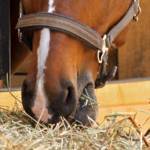Preventing Colic and Laminitis After a Horse Overeats

Horse owners know to keep their animals and feed secure in order to prevent a loose horse from gorging on feed, as a sudden intake of a large quantity of feed can cause colic and laminitis. But what happens when Houdini escapes his stall on the one night you forgot to double-check the feed room door?
Your first step should be to get the horse away from the source of feed and assess how much and what he’s eaten; horses can suffer adverse effects from eating as little as a few extra pounds of grain if they are not accustomed to it. Then call your veterinarian.
Horses experiencing a grain overload often can be successfully treated with laxatives, mineral oil, fluids, and anti-inflammatories. A veterinarian could also give the horse activated charcoal via a nasogastric tube to limit the absorption of the feed.
Along with seeing to the potential gastrointestinal effects, horse owners can take steps to prevent laminitis after a grain binge. Note the temperature and pulse in the horse’s feet to establish a baseline in order to help you recognize any changes later.
Even if you don’t currently see any clinical signs of laminitis, soak the horse’s feet and lower limbs in ice water as often as possible for the next several days. Don’t worry about them getting too cold. Researchers have used this method continuously for up to 48 hours without damaging tissues.
Early intervention and the duration of the icing are the most important factors in preventing laminitis. Start the protocol as soon as possible and maintain it for several days, or until your veterinarian advises you to stop. If you note any additional heat in the feet, elevated digital pulse, soreness, or unusual stance (rocking back on its heels), call your veterinarian.
It’s also advisable to monitor the horse’s temperature as an early indicator of endotoxemia. If the temperature rises above normal, call your veterinarian.
A horse bingeing on grain is always a cause for concern, but with a plan and veterinary assistance, horse owners can help to keep ill effects of equine overeating to a minimum.








